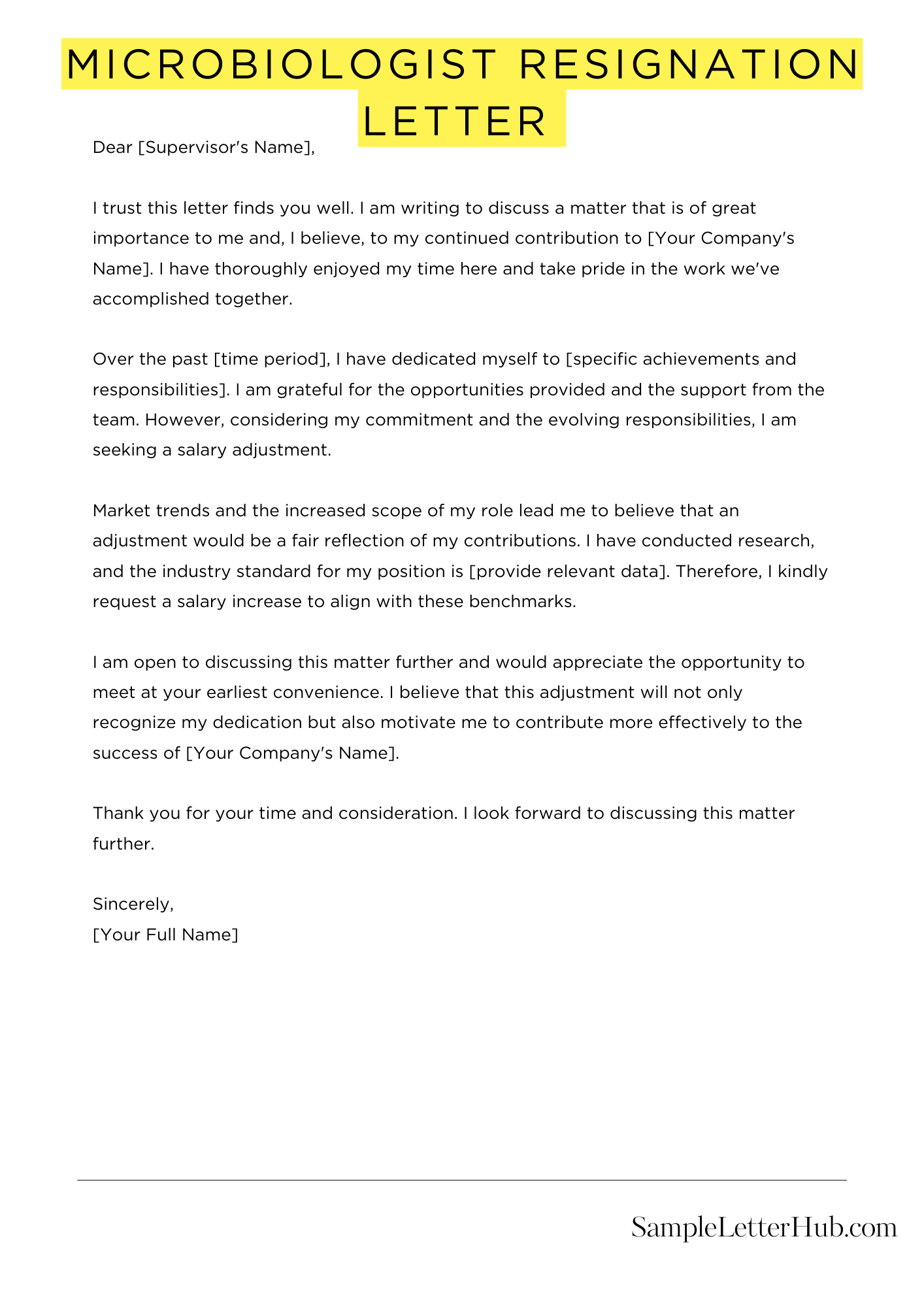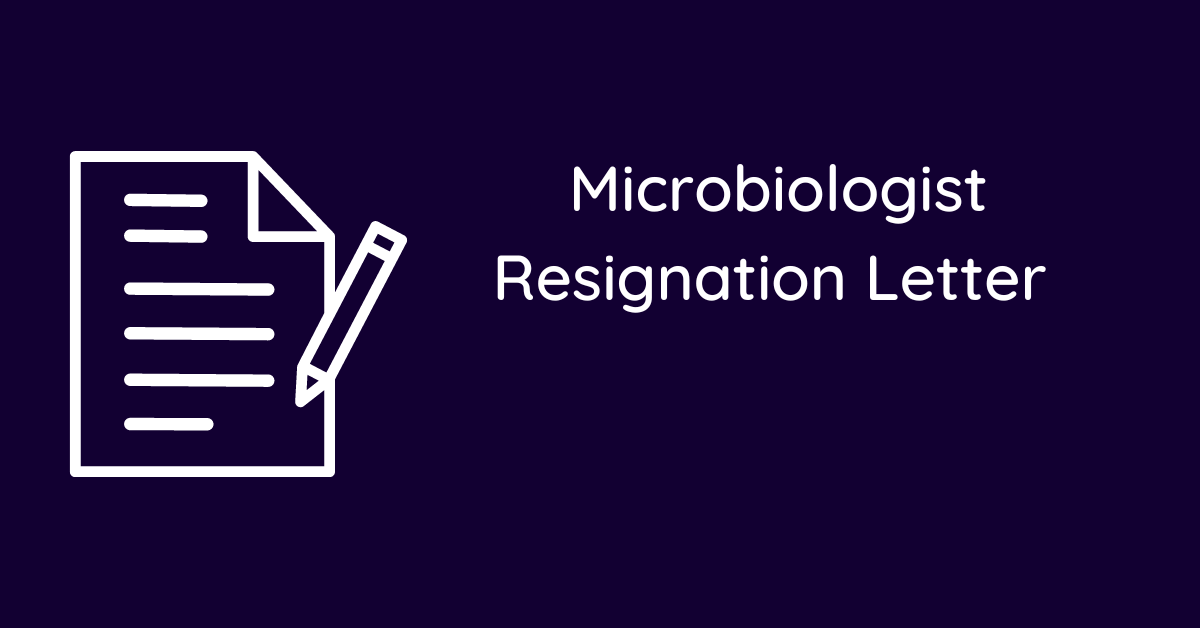When it comes to leaving a job, one way to do so is to write a clear and professional resignation letter. In this article, we will share an example of a microbiologist resignation letter with you.
In your resignation letter, it is important to be polite and humble in your tone. You should also be clear and concise in your explanation of why you are leaving. It is also important to thank your employer for the opportunity to work at the company.
Below, we have shared a template/example microbiologist resignation letter that you can use. Please note that this is just a template, and you may need to tailor it to your specific situation.
Microbiologist Resignation Letter
Dear [Recipient Name],
Please accept this letter as formal notification that I will be resigning from my position as a Microbiologist at [Company/Organization Name], effective two weeks from today, [Last Date of Employment].
I have enjoyed my time at [Company/Organization Name] and am grateful for the opportunities and experiences I have gained during my tenure. I have learned a great deal and have developed valuable skills that will serve me well in my future endeavors.
I wish you and [Company/Organization Name] all the best in the future.
Sincerely,
[Your Signature]
Short Microbiologist Resignation Letter Sample
Please accept this letter as formal notification that I am resigning from my position as Microbiologist at [Company Name]. My last day of employment will be [Your Last Day]. Thank you for the opportunity to grow and learn during my time here. I wish you and the company continued success. I am happy to assist in the transition process to ensure a smooth handover of my responsibilities.
I wish you all the best with your microbiologist resignation letter.
When it’s time to say farewell, expressing your gratitude and best wishes can make the transition smoother:

How to Write a Microbiologist Resignation Letter
1. Start with a Formal Introduction
Begin your letter with a formal salutation, such as “Dear [Manager’s Name].” State your intent to resign from your position as a Microbiologist at [Company Name], effective [Your Last Date of Employment].
2. Express Gratitude and Appreciation
Take this opportunity to express your gratitude for the opportunities and experiences you have gained during your time at the company. Highlight specific projects or accomplishments that you are particularly proud of.
3. State Your Reasons for Leaving
While it is not necessary to go into excessive detail, you may briefly state your reasons for leaving. This could include pursuing further education, a new career opportunity, or personal reasons.
4. Offer to Assist with the Transition
Demonstrate your professionalism by offering to assist with the transition during your notice period. This could include training your replacement, completing ongoing projects, or providing documentation.
5. End with a Positive Note
Conclude your letter with a positive and professional tone. Wish the company and your colleagues well in the future and express your appreciation for their support.
6 Most Frequently Asked Questions About Microbiologist Resignation Letters
Microbiologists play a crucial role in safeguarding public health, advancing scientific knowledge, and developing innovative solutions for various challenges. However, there may come a time when a microbiologist decides to resign from their position. Here are the six most frequently asked questions about writing a microbiologist resignation letter:
1. What should I include in my resignation letter?
A well-structured microbiologist resignation letter typically includes the following elements:
- A clear statement of your intent to resign, including your last date of employment.
- A brief expression of gratitude for the opportunities and experiences you gained during your time with the organization.
- A professional and courteous tone, even if you are leaving for personal reasons.
- A formal closing, such as “Sincerely” or “Respectfully,” followed by your signature and typed name.
2. How long should my resignation letter be?
Keep your resignation letter concise and to the point. Aim for a length of no more than three to four paragraphs, each focusing on a specific aspect of your resignation. Avoid unnecessary details or rambling, as brevity is appreciated by both the recipient and the reader.
3. When should I submit my resignation letter?
It is generally considered good practice to provide at least two weeks’ notice when resigning from a position. This allows your employer sufficient time to prepare for your departure and make arrangements for a smooth transition. However, in some cases, you may need to provide more notice, especially if you have a long tenure with the organization or hold a senior position.
4. Can I negotiate my departure date?
In some cases, you may be able to negotiate your departure date with your employer. This is especially true if you have a specialized skill set or if your departure would create a significant disruption to the organization. However, it is important to be flexible and understanding of your employer’s needs.
5. What if I am leaving on bad terms?
Even if you are leaving your position on bad terms, it is important to maintain a professional demeanor in your resignation letter. Avoid making negative comments or accusations, as this will only reflect poorly on you. Instead, focus on the positive aspects of your experience and express your gratitude for the opportunities you have been given.
6. Do I need to provide a reason for leaving?
You are not obligated to provide a reason for leaving in your resignation letter. However, it is common to briefly state your reasons for leaving, such as pursuing a new opportunity or returning to school. Keep your explanation brief and professional, and avoid going into too much detail.
Before making the decision to resign from your job, it’s essential to consider the legal aspects:
Understanding your emotions after quitting your job is important. Explore why you might be feeling sad:
Related
- Resignation letter sample
- Forced resignation letter
- Resignation letter due to going abroad
- Resignation letter due to marriage
- Resignation letter due to other opportunity
- Resignation letter due to mistake

